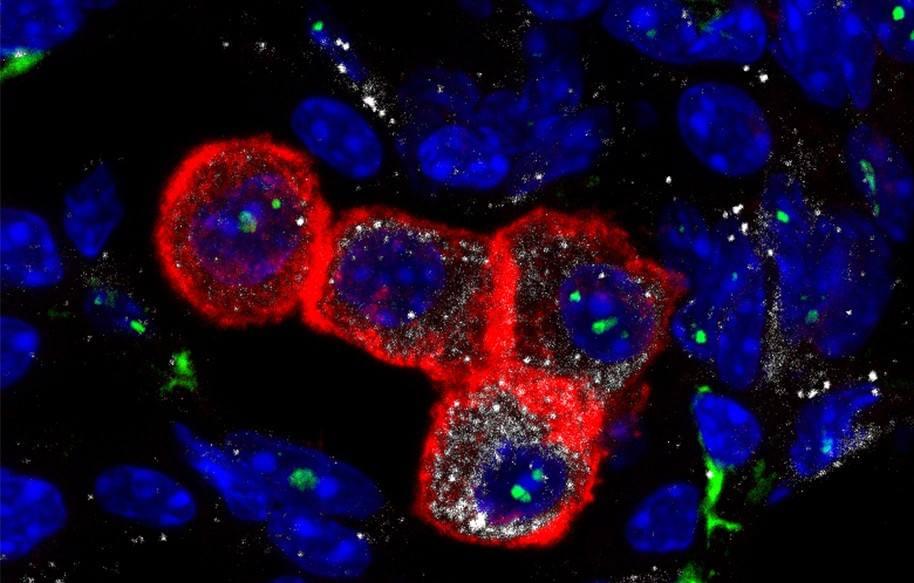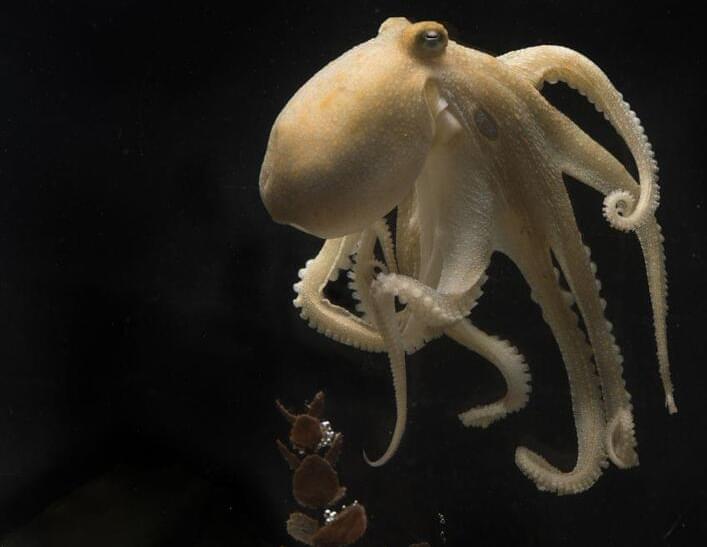Researchers have discovered a type of white blood cell in the lungs, called senescent macrophages, that promote tumor growth.



For many years, the fields of physics and chemistry have held the belief that the properties of solid materials are fundamentally determined by the atoms and molecules they consist of. For instance, the crystalline nature of salt is credited to the ionic bond formed between sodium and chloride ions. Similarly, metals such as iron or copper owe their robustness to the metallic bonds between their respective atoms, and the elasticity of rubbers stems from the flexible bonds in the polymers that form them. This principle also applies to substances like fungi, bacteria, and wood.
Or so the story goes.
A new paper recently published in Nature upends that paradigm, and argues that the character of many biological materials is actually created by the water that permeates these materials. Water gives rise to a solid and goes on to define the properties of that solid, all the while maintaining its liquid characteristics.


It has almost been 20 years since the establishment of the field of two-dimensional (2D) materials with the discovery of unique properties of graphene, a single, atomically thin layer of graphite. The significance of graphene and its one-of-a-kind properties was recognized as early as 2010 when the Nobel prize in physics was awarded to A. Geim and K. Novoselov for their work on graphene. However, graphene has been around for a while, though researchers simply did not realize what it was, or how special it is (often, it was considered annoying dirt on nice, clean surfaces of metals REF). Some scientists even dismissed the idea that 2D materials could exist in our three-dimensional world.
Today, things are different. 2D materials are one of the most exciting and fascinating subjects of study for researchers from many disciplines, including physics, chemistry and engineering. 2D materials are not only interesting from a scientific point of view, they are also extremely interesting for industrial and technological applications, such as touchscreens and batteries.
We are also getting very good at discovering and preparing new 2D materials, and the list of known and available 2D materials is rapidly expanding. The 2D materials family is getting very large and graphene is not alone anymore. Instead, it now has a lot of 2D relatives with different properties and vastly diverse applications, predicted or already achieved.

Why does all of this matter? The unfortunate truth is that each of us will experience plenty of mental pain, misery, and frustration in our lifetimes. Mistaking the voice in our head for a thing and labeling it “me” brings us into conflict with the neuropsychological evidence that shows there is no such thing. This mistake — this illusory sense of self — is the primary cause of our mental suffering. When you can’t sleep at night, is it because you are worried about a stranger’s problems, or is it your problems that keep you up? For most of us, we worry about my work problems, my money problems, and my relationship problems. What would happen if we removed the “self” from these problems?
I am distinguishing mental suffering from physical pain. Pain occurs in the body and is a physical reaction—like when you stub your toe or break an arm. The suffering I speak of occurs in the mind only and describes things such as worry, anger, anxiety, regret, jealousy, shame, and a host of other negative mental states. I know it’s a big claim to say that all these kinds of suffering are the result of a fictitious sense of self. For now, the essence of this idea is captured brilliantly by Taoist philosopher and author Wei Wu Wei when he writes, “Why are you unhappy? Because 99.9 percent of everything you think, and of everything you do, is for yourself — and there isn’t one.”

Summary: Researchers developed a machine learning algorithm, FoodProX, capable of predicting the degree of processing in food products.
The tool scores foods on a scale from zero (minimally or unprocessed) to 100 (highly ultra-processed). FoodProX bridges gaps in existing nutrient databases, providing higher resolution analysis of processed foods.
This development is a significant advancement for researchers examining the health impacts of processed foods.


A groundbreaking manifesto on living better and longer that challenges the conventional medical thinking on aging and reveals a new approach to preventing chronic disease and extending long-term health, from a visionary physician and leading longevity expert.
“One of the most important books you’ll ever read.”—Steven D. Levitt, New York Times bestselling author of Freakonomics
Wouldn’t you like to live longer? And better? In this operating manual for longevity, Dr. Peter Attia draws on the latest science to deliver innovative nutritional interventions, techniques for optimizing exercise and sleep, and tools for addressing emotional and mental health.

I quoted and responded to this remark:
“…we probably will not solve death and this actually shouldn’t be our goal.” Well nice as she seems thank goods Dr Levine does not run the scientific community involved in rejuvenation.
The first bridge looks like it’s going to be plasma dilution and this may come to the general population in just a few short years. People who have taken this treatment report things like their arthritis and back pain vanishing.
After that epigentic programming to treat things that kill you in old age. And so on, bridge after bridge. if you have issues with the future, some problem with people living as long as they like, then by all means you have to freedom to grow old and die. That sounds mean but then I think it’s it’s mean to inform me I have to die because you think we have to because of “progress”. But this idea that living for centuries or longer is some horrible moral crime just holds no water.
Science can’t stop aging, but it may be able to slow our epigenetic clocks.